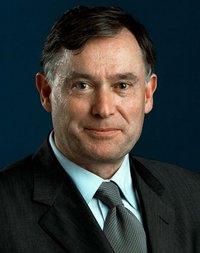|
|
| ||||||||||||||||||
Horst Köhler (Template:Audio, born 22 February 1943) is the President of Germany. Köhler was narrowly elected by the Bundesversammlung (Federal Assembly) on May 23, 2004, and was subsequently inaugurated on July 1, 2004. Prior to his election, Köhler had had a distinguished career in politics and the civil service, and had most recently been head of the International Monetary Fund (IMF).
Biography
Köhler was born in Skierbieszów in German-occupied Poland, as the seventh of eight children into a family of Volksdeutsche from Glückstal in Romanian Bessarabia (now part of Moldova). His parents had to leave their home in Bessarabia in 1940 during the Nazi-Soviet population transfers that followed the Molotov-Ribbentrop Pact, which awarded Bessarabia to the Soviet Union. As part of the Generalplan Ost, they were in 1942 resettled in Skierbieszów, a village in Zamosc County, Eastern Poland. As the German army retreated from Eastern Europe towards the end of World War II, the Köhler family fled to Leipzig, and in 1953 they fled to Ludwigsburg (12 km north of Stuttgart's city center) to escape from the communist regime in the GDR.
Köhler took his Abitur in 1963, served his military service in the mechanized infantry (Panzergrenadiere) and became lieutenant of the Reserve. He earned a doctorate in economics and political sciences from Eberhard Karls University of Tübingen, where he was a scientific research assistant at the Institute for Applied Economic Research from 1969 to 1976.
Köhler was appointed Managing Director and Chairman of the Executive Board of the International Monetary Fund (IMF) in 2000. The German government nominated him after their first nominee, Caio Koch-Weser, was vetoed by the United States. Prior to joining the IMF, he had held positions in both the public and private sectors. He was under-secretary of state in the finance ministry from 1990 to 1993, and he served as sherpa for Chancellor Helmut Kohl, preparing G7 summits and other international economic conferences. Between 1993 and 1998 he served as chairman of the association of savings banks in Germany (Deutscher Sparkassen- und Giroverband). In 1998 he was appointed president of the European Bank for Reconstruction and Development.
On 4 March 2004, Köhler resigned his post with the IMF after being nominated by Germany's conservative and liberal opposition parties as their presidential candidate. He was selected by Angela Merkel's Christian Democratic Union (CDU), currently Germany's largest oppositon party, and endorsed by its Bavarian sister party, Edmund Stoiber's Christian Social Union (CSU), as well as by the small liberal party, the Free Democratic Party of Germany (FDP) of Guido Westerwelle. As opposition parties currently control a majority of votes in the Bundesversammlung (an electoral college consisting of the membership of the Bundestag and an equal number of delegates from the legislatures of each state), the result of the vote was virtually a foregone conclusion, but was closer than expected. Köhler defeated Gesine Schwan on the first ballot by 604 votes to 580; 20 votes were cast for minor candidates, while one elector was absent because of a heart attack.
Köhler succeeded Johannes Rau as President on 1 July 2004, for a five-year term. Germany's presidency is a mostly ceremonial office, but carries considerable moral authority and gives the President a platform from which to represent his country internationally. While the president's regular residence Bellevue Palace is under reconstruction he has taken his office at Charlottenburg Castle in Berlin.
Upon his election, Köhler, a conservative German patriot, said that "Patriotism and being cosmopolitan are not opposites". "He appeared an enlightened patriot who genuinely loves his country and is not afraid to say so", the newspaper Die Welt wrote. Presenting his visions for Germany, Köhler also said that "Germany should become a land of ideas", and emphasized the importance of globalisation, and that Germany would have to fight for its place in the 21st century.
He is married to Eva Köhler, born Eva Luise Bohnet, a teacher of German, and they have two children, a daughter Ulrike (born 1972) and a son Jochen (born 1977). Horst Köhler is Protestant.
External links
- Official page of the Federal President (http://www.bundespraesident.de/en)
- Biographical information (http://www.imf.org/external/np/omd/bios/hk.htm) (IMF)
- Horst Köhler's speech in Berlin upon his election as president (MP3) (http://www.cducsu.de/aktuelles/audio/koehler040523.mp3) text (http://www.faz.net/s/RubFC06D389EE76479E9E76425072B196C3/Doc~EE2DB4A5EE8FA42BAA098D0508825B300~ATpl~Ecommon~Scontent.html)
| Preceded by: Johannes Rau | President of Germany 2004-.... | Succeeded by: / |
da:Horst Köhler
de:Horst Köhler
el:Χορστ Κέλερ
et:Horst Köhler
es:Horst Köhler
eo:Horst KÖHLER
fr:Horst Köhler
gl:Horst Köhler
id:Horst Köhler
ja:ホルスト・ケーラー
no:Horst Köhler
nds:Horst Köhler
nl:Horst Köhler
pl:Horst Köhler
pt:Horst Köhler
fi:Horst Köhler
sv:Horst Köhler
zh-cn:霍斯特·克勒

